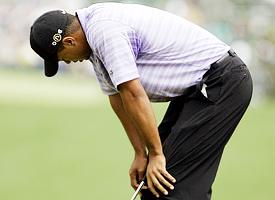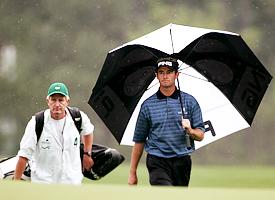Top four players not as dominant as weather
Updated: April 8, 2005, 10:02 PM ET
By Jason Sobel | ESPN.com
AUGUSTA, Ga. -- We should be halfway through The Masters, but instead we're only halfway through half of The Masters, so it might be time to look at who's been causing all this commotion on the PGA Tour this year.

AP Photo/Amy SancettaEven Tiger can't win when it's raining out.
Nine events delayed by weather issues. Three of them finished on a Monday.
And still, all golf fans want to talk about are ... golfers?
Still, the Big Four was the talk of the town entering tournament time, with most people expecting one of the elite players to be wearing a green jacket come Sunday.
Well, without much golf to speak of here at Augusta National, there's no better time to look at who has been more dominant -- the celebrated quartet of Vijay Singh, Tiger Woods,Ernie Els and Phil Mickelson? Or Mother Nature, heretofore known on tour as the Big Pour?
The Big Four has won major championships a combined 15 times.
The Big Pour has been a major pain in the neck nine times this season.
The Big Four is struggling to keep Retief Goosen out of their foursome.
The Big Pour knows Goose struggles anytime someone even mentions the thought of lightning.
The Big Four make for exciting final-round finishes (see: Doral).
The Big Pour makes for exhausting final-round finishes (see: just about everywhere else).
Ah, but there is one large difference between the Big Four and the Big Pour. Golf fans -- uh, patrons, this week -- actually enjoy watching the players, and for good reason: Vijay's noted work ethic, Phil's electric smile, Ernie's easy swing and Tiger's ability to, well, hit the ball really, really far.
Then again, the Big Pour never putted a ball into a water hazard. Ouch, Tiger.
Woods' slip-up on Augusta National's 13th hole on Thursday notwithstanding, we've been left, well, high and dry, waiting for the superstars to towel off and get in gear.
When they've played, each has been terrific at times; the Big Four has combined for eight wins worldwide this season. But when they're all washed out, there's nothing left to do but watch the greens get soft.
So what does Woods have to say to current climate conditions which are, um, trying to steal his thunder, so to speak?
"You have to accept it and be patient and ... be ready to play when your name is called," he said at the overly waterlogged Players Championship two weeks ago.
Either way, it beats watching the raindrops fall.
Or as some like to call it, the Big Bore.
Jason Sobel is ESPN.com's golf editor. He can be reached at Jason.Sobel@espn3.com

